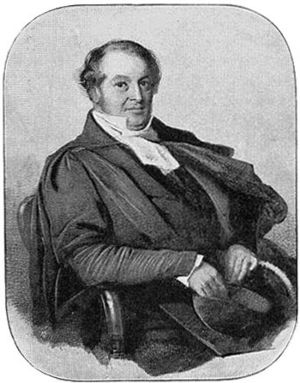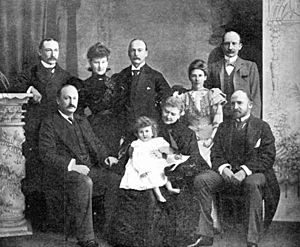Baden Powell (mathematician) facts for kids
Quick facts for kids
Baden Powell
|
|
|---|---|
 |
|
| Born | 22 August 1796 Stamford Hill, Hackney, London, England
|
| Died | 11 June 1860 (aged 63) Kensington, London, England
|
| Nationality | English |
Baden Powell (born August 22, 1796 – died June 11, 1860) was an English mathematician and a Church of England priest. He was a professor of geometry at the University of Oxford from 1827 to 1860. Powell was known for his advanced ideas about evolution and his support for scientific thinking.
Contents
Who Was Baden Powell?
Baden Powell was born in Stamford Hill, Hackney, London. His father, Baden Powell I, was a successful wine merchant. His mother was Hester Powell. The Powell family had been farmers in Suffolk since the 1500s. Later, some family members became merchants in London.
His Early Life and Studies
Powell went to Oriel College, Oxford for his university studies. He earned a top degree in mathematics in 1817. After his studies, he became a priest in the Church of England in 1821. He first worked as a curate in Midhurst, Sussex. Later, he became the Vicar of Plumstead, Kent. This is where he began his scientific work, including experiments with heat.
Family Life
Baden Powell was married three times and had fourteen children. After his death, his third wife changed the last name of their children to "Baden-Powell". This is why many of his children are known by that famous name.
His Children
Powell's first marriage to Eliza Rivaz had no children. His second marriage to Charlotte Pope had one son and three daughters:
- Charlotte Elizabeth Powell (1838–1917)
- Baden Henry Baden-Powell (1841–1901)
- Louisa Ann Powell (1843–1896)
- Laetitia Mary Powell (1844–1865)

His third marriage to Henrietta Grace Smyth had seven sons and three daughters:
- Henry Warington Baden-Powell (1847–1921), a naval officer.
- Sir George Smyth Baden-Powell (1847–1898), a politician.
- Augustus Smyth Powell (1849–1863)
- Francis (Frank) Smyth Baden-Powell (1850–1933), an artist.
- Henrietta Smyth Powell (1851–1854)
- John Penrose Smyth Powell (1852–1855)
- Jessie Smyth Powell (1855–1856)
- Robert Stephenson Smyth Baden-Powell (1857–1941), who founded the Boy Scouts and Girl Guides.
- Agnes Smyth Baden-Powell (1858–1945), who helped found the Girl Guides.
- Baden Fletcher Smyth Baden-Powell (1860–1937), an army officer and aviator.
Ideas on Evolution and Science
Baden Powell strongly believed that the laws of nature were always the same. He supported the idea of evolution even before Charles Darwin shared his famous theories. Powell thought that science and religious texts should be kept separate. He believed that God's work (nature) and God's word (scripture) were different.
He argued that if God created laws for the universe, then a "miracle" would mean breaking those laws. This idea was very new and bold for his time. He also supported the idea of uniformitarian geology, which says that Earth's processes have always been the same.
Supporting Darwin's Ideas
When Charles Darwin and Alfred Russel Wallace introduced the idea of natural selection in 1858, Powell believed it made creation seem more logical. He thought that natural selection helped explain how new species came to be.
Powell was one of seven liberal theologians who wrote a book called Essays and Reviews in 1860. This book discussed Darwin's On the Origin of Species. Powell wrote that Darwin's book would "bring about an entire revolution in opinion" about how nature works. He passed away shortly before a big debate about Darwin's theory in Oxford.
His Writings
Baden Powell wrote many books and papers on science and theology. Here are some of his important works:
- 1837: History of Natural Philosophy from the Earliest Periods to the Present Time
- 1838: The Connexion of Natural and Divine Truth
- 1841: A General and Elementary View of the Undulatory Theory (about light)
- 1855: Essays on the Spirit of the Inductive Philosophy, the Unity of Worlds, and the Philosophy of Creation
- 1859: The Order of Nature: Considered in Reference to the Claims of Revelation
Other Publications
Powell also wrote many articles for scientific journals and reports for groups like the Royal Society. He wrote about topics like radiant heat, the dispersion of light, and luminous meteors. He also published theological works, discussing the relationship between faith and science.
Legacy
One of Baden Powell's notable students was Lewis Carroll, who wrote Alice in Wonderland. Carroll attended Powell's lectures on geometry. In 1970, many of Powell's books were given to the Bodleian Libraries by his grandson.
Images for kids
 | Frances Mary Albrier |
 | Whitney Young |
 | Muhammad Ali |


